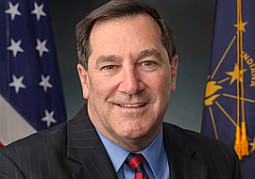Washington, D.C. – As North Korea continues its unacceptable provocations, U.S. Senators Joe Donnelly (D-IN) and Ben Sasse (R-NE) continue to push for increased sanctions on both North Korea and China designed to crack down on the rogue regime’s weapons program. Donnelly and Sasse sent a letter Wednesday to Senate Banking Committee Chairman Mike Crapo (R-ID) and Ranking Member Sherrod Brown (D-OH) outlining recent findings on North Korean sanctions and outlining key questions for future full committee hearings. Donnelly and Sasse serve as Ranking Member and Chairman of the Senate Banking Subcommittee on National Security and International Trade and Finance.
Building on a May subcommittee hearing, Donnelly and Sasse encouraged the Banking Committee to push the Administration on its options to expand sanctions and highlight the additional tools available to punish North Korea and those who assist in their illegal activity.
Donnelly and Sasse said in their letter, in part, “As you plan the Banking Committee’s schedule for the coming months, we welcome your consideration of a full committee hearing on sanctions against the Democratic People’s Republic of Korea (DPRK)…On May 10, 2017, the Banking Subcommittee on National Security and International Trade and Finance held a hearing on ‘Secondary Sanctions against Chinese Institutions: Assessing Their Utility for Constraining North Korea.’
“…there is a strong consensus that the level of pressure necessary to get the Kim regime to the table, let alone reach an agreement, will be extraordinarily high and must be coupled with a full court diplomatic effort with our allies and with China directly to persuade China to engage more directly with the DPRK. It is our shared belief that the current multilateral sanctions may be insufficient to achieve this goal, even after the progress made at the United Nations in August. Continued U.S. engagement and leadership will therefore be critical in the months ahead and must include a comprehensive effort to ensure rigorous enforcement of all U.S. and multilateral sanctions.
“…Finally, and most importantly, our witnesses stressed that increasing sanctions pressure on the DPRK to the level necessary to force negotiations requires a deliberate, forceful, and coordinated diplomatic effort by the United States coupled with tough sanctions enforcement.”
To read the full letter click here or read below:
August 30, 2017
The Honorable Mike Crapo
Chairman
U.S. Senate Committee on Banking, Housing and Urban Affairs
The Honorable Sherrod Brown
Ranking Member
U.S. Senate Committee on Banking, Housing and Urban Affairs
Dear Chairman Crapo and Ranking Member Brown:
As you plan the Banking Committee’s schedule for the coming months, we welcome your consideration of a full committee hearing on sanctions against the Democratic People’s Republic of Korea (DPRK). This is an important and timely subject. We are writing to share with you some key findings and issues worthy of further review from our subcommittee’s examination of the impact U.S. and international sanctions are having on Kim Jong-Un’s regime and its pursuit of weapons of mass destruction.
On May 10, 2017, the Banking Subcommittee on National Security and International Trade and Finance held a hearing on “Secondary Sanctions against Chinese Institutions: Assessing Their Utility for Constraining North Korea.” With the DPRK already largely isolated from the global economy, China accounts for more than 90 percent of the DPRK’s total trade and is the economic lifeline of the Kim regime. China’s support of new multilateral sanctions in 2016 and especially the most recent United Nations (UN) Security Council resolution passed with unanimous support in 2017 marks meaningful progress. However, the fact remains that China has a mixed record on enforcing both the letter and the spirit of sanctions against the DPRK. For example, despite agreeing to UN sanctions packages in 2016, China’s trade with the DPRK in the first quarter of 2017 was up nearly 40 percent from the same period in 2016.
Our hearing included testimony from Juan Zarate and Adam Szubin, former Treasury Department officials and widely respected sanctions experts whose service spans Republican and Democratic administrations. The witnesses agreed on many key points, a few of which we highlight below.
First, both witnesses believe, cautiously, that it is possible to generate enough sanctions pressure to force the DPRK government to the table to negotiate a verifiable end to its nuclear weapons program. As Mr. Szubin stated, “North Korea is not self-reliant or ‘sanctions proof.’” However, there is a strong consensus that the level of pressure necessary to get the Kim regime to the table, let alone reach an agreement, will be extraordinarily high and must be coupled with a full court diplomatic effort with our allies and with China directly to persuade China to engage more directly with the DPRK. It is our shared belief that the current multilateral sanctions may be insufficient to achieve this goal, even after the progress made at the United Nations in August. Continued U.S. engagement and leadership will therefore be critical in the months ahead and must include a comprehensive effort to ensure rigorous enforcement of all U.S. and multilateral sanctions.
Second, while our witnesses agreed that the U.S. will need to sanction Chinese entities to strengthen enforcement against the DPRK, they called for nuance and collaboration over a directly adversarial approach between Washington and Beijing. They call for operating within a framework of law and order, working together with China to, as Mr. Zarate put it, “isolate rogue financial and commercial activity and those flouting legitimate authority.” Without this kind of collaboration, Mr. Szubin argued, threatening or imposing secondary sanctions against Chinese targets “may change the conduct of individual Chinese entities… but it will not bring about the kind of comprehensive and sustained crackdown by Chinese authorities, traders, bankers and businesspeople that is required to bring North Korea to the table. That type of sanctions pressure will only be achieved when the Chinese government agrees to apply it.”
Finally, and most importantly, our witnesses stressed that increasing sanctions pressure on the DPRK to the level necessary to force negotiations requires a deliberate, forceful, and coordinated diplomatic effort by the United States coupled with tough sanctions enforcement. Mr. Zarate stated, “To be effective, an attempt to use sanctions or financial measures of any sort must nest within a coherent strategy and cannot stand alone.” China must be persuaded that our paramount interest in addressing the DPRK’s nuclear and ballistic missile programs is not necessarily at odds with their principal interest in avoiding regime collapse.
We hope these fundamental findings are useful to you as you consider calling current administration officials to testify before the full committee and recommend the following questions as worthy of further consideration by the committee:
- What is North Korea’s objective in pursuing its nuclear weapons and ballistic missiles programs, and what are its internal and external objectives with regards to the geographic paths of its missiles and its rate of current testing?
- What is the administration’s strategy on the DPRK? What is the end goal on the DPRK and will the strategy achieve that goal?
- How does the Defense Intelligence Agency’s assessment, as reported in the press, that the DPRK has miniaturized a nuclear weapon alter the administration’s end goal or strategy?
- How does the sanctions-related and illicit finance work of the Treasury Department, specifically the Office of Terrorism and Financial Intelligence, nest within this strategy?
- What, if any, additional authorities does Treasury need to implement its strategy?
- How are Treasury Department officials working with other relevant departments and agencies to coordinate efforts on the DPRK?
- Does Treasury believe it has sufficient mechanisms in place to prevent North Korea from circumventing sanctions via illicit activities and underground markets?
- Is the Treasury Department sufficiently resourced to monitor primary and secondary sanctions against the DPRK?
- Do Treasury Department officials agree that it is possible to bring the DPRK to the negotiating table through sanctions pressure, and if so, are stronger U.S. or multilateral sanctions necessary to achieve that goal?
- How will the Countering America’s Adversaries Through Sanctions Act (P.L. 115-44) be used by the Treasury Department to increase sanctions pressure on the DPRK?
Thank you for your consideration of our input. We look forward to working with you to address this timely and important matter before the full committee.
Sincerely,
Ben Sasse
Chairman
Subcommittee on National Security and International Trade and Finance
Joe Donnelly
Ranking Member
Subcommittee on National Security and International Trade and Finance















